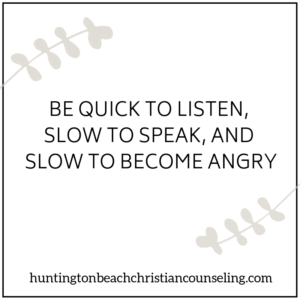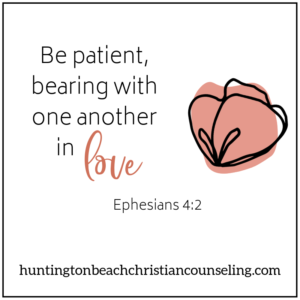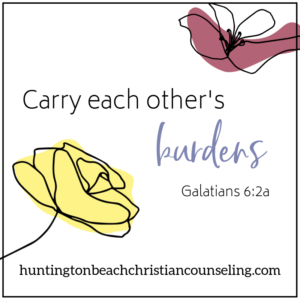5 Comforting Bible Verses for Mourning: Finding Hope in God’s Word
With every death, comes a sense of loss. While friends and loved ones may comfort you in your time of mourning, they cannot always understand the gaping hole of loss that you feel, particularly if they have not experienced a similar type of grief.
God’s Word will speak to your heart and mind, as the Lord alone knows exactly where you are.
There are many Bible verses about loss that you can turn to, trusting that through meditation on Scripture, God will give you the peace and hope that you need and the strength to get through each day. Huntington Beach Christian Counseling can provide the support and guidance you need to navigate through grief and find peace through faith.
5 Bible Verses for Mourning
Here are 5 Bible verses for mourning to comfort you in a time of loss:
You who live in the shelter of the Most High, who abide in the shadow of the Almighty, will say to the Lord, “My refuge and my fortress; my God in whom I trust.” – Psalm 91:1-2
 If you’re experiencing the deep depths of sorrow and it feels impossible to function, remind yourself through this and other Bible verses about loss that, as a Christian, you live under the shelter and protection of the Almighty God, creator of the universe and loving, trustworthy Father, who numbers every hair on your head.
If you’re experiencing the deep depths of sorrow and it feels impossible to function, remind yourself through this and other Bible verses about loss that, as a Christian, you live under the shelter and protection of the Almighty God, creator of the universe and loving, trustworthy Father, who numbers every hair on your head.
He promises refuge from the raging torrents of emotion that come with grief, and his strength and safety is nothing less than that of a fortress. Psalm 62:1-2 repeats this imagery, “My soul finds rest in God alone; my salvation comes from him. He alone is my rock and my salvation; he is my fortress, I will never be shaken.” We may feel shaken, but we never move into a position of vulnerability, outside of the realm of his secure grasp.
What’s more, providing comfort is God’s speciality – “He heals the brokenhearted and binds up their wounds.” (Psalm 147:3). In the midst of grief is God himself. He will meet us, give us Himself, fill the void left by our loved ones, warm our hearts, lift our burdens and swaddle us in His love. Through deepened faith and trust, we can experience deep and true joy, even in our heartache.
Do not fear, for I have redeemed you; I have called you by name, you are mine. When you pass through the waters, I will be with you; and through the rivers, they shall not overwhelm you; when you walk through fire you shall not be burned, and the flame shall not consume you. For I am the Lord you God, the Holy One of Israel, your Savior. – Isaiah 43:1-3
This verse does not refer to loss specifically, but it follows on from the idea above that God does not leave us alone in our times of difficulty. We don’t have to figure out how to handle grief on our own; he walks every step of the way with us.
 Think of Jesus who was “despised and rejected by men, a man of sorrows and acquainted with grief” (Isaiah 53:3). Jesus lived life in this broken world and knew the torment of pain. As our perfect High Priest, he fully understands our anguish, and intercedes for us (Hebrews 7:25), as does the Holy Spirit (Romans 8:26).
Think of Jesus who was “despised and rejected by men, a man of sorrows and acquainted with grief” (Isaiah 53:3). Jesus lived life in this broken world and knew the torment of pain. As our perfect High Priest, he fully understands our anguish, and intercedes for us (Hebrews 7:25), as does the Holy Spirit (Romans 8:26).
He empathises with us when it feels as though the waters will close in on us or the flames will engulf. God hates death even more than we do, and that is why he sent His son. In our lowest moments, He is Immanuel – God with us.
May God, the source of hope, fill you with all joy and peace by means of your faith in him, so that your hope will continue to grow by the power of the Holy Spirit.– Romans 15:13
One might not think that Bible verses about loss would contain words like hope, joy, and peace, but that is the miracle of living a life redeemed by Christ. When it feels like we’ve been stripped of a physical blessing in this life, our soul is laid bare and all we have is our faith in God, the source of hope.
We may not feel like we have faith, and we may not always see God as the source of hope, but our feelings do not change the reality of who God is and what He has done. Despite the reality of our loss, God can give us hope and strength for each day.
“When I called, you answered me; you greatly emboldened me,” says Psalm 138:3. Psalm 112:1, 7-8 offers further encouragement: “Praise the Lord! Happy are those who fear the Lord. They are not afraid of evil tidings; their hearts are firm, secure in the Lord. Their hearts are steady, they will not be afraid.” When life calls us to carry on with the day-to-day, despite our emotional state, God will grant us peace and a steady heart to do what we need to do without fear.
He will wipe every tear from their eyes. There will be no more death or mourning or crying or pain, for the old order of things has passed away. – Revelation 21:4
 The reason why we, as Christians, can have hope, is that our grief, no matter how devastating, is temporary. We grieve genuinely (when in 1 Thessalonians 4:13 Paul says to not “grieve as others do who have no hope,” he assumes that grieving is an important and necessary process) but do not despair. We have full sorrow, but also full hope – the end is coming and it is glorious!
The reason why we, as Christians, can have hope, is that our grief, no matter how devastating, is temporary. We grieve genuinely (when in 1 Thessalonians 4:13 Paul says to not “grieve as others do who have no hope,” he assumes that grieving is an important and necessary process) but do not despair. We have full sorrow, but also full hope – the end is coming and it is glorious!
As Paul says in Romans 8:18-3, “I consider that our present sufferings are not worth comparing with the glory that will be revealed in us.” If this life brings nothing but pain, sadness, and disappointment; it’s okay – everything is going to be made right again when Jesus Christ returns. As we meditate on Bible verses for mourning and look at Scripture for loss, we can be assured that our tears will not be there in heaven.
For we believe that Jesus died and rose again, and so we believe that God will bring with Jesus those who have fallen asleep in him. – 1 Thessalonians 4:14
If the person whose passing you are mourning was a Christian, that means that they are more alive than ever, and are experiencing life, joy, and glory beyond anything that we can imagine, in God’s presence. It may seem that God did not “heal” or “protect” them, but He has in fact done that in a much deeper, fuller way.
When we know for certain that our loved one is free and alive, it can lessen our sadness as we reflect on the reality of heaven. When we meditate on Bible verses about loss, we can remind ourselves that our loss is not eternal – we will be reunited with our loved one again.
Christian Grief Counseling in Huntington Beach
 Dealing with loss is never easy, and sometimes God’s Word seems distant. In these instances, reach out to a Christian friend who can pray for you, and even read these Bible verses for mourning to you. A big way in which God provides great comfort to us is through the body of believers, supporting each other in times of crisis.
Dealing with loss is never easy, and sometimes God’s Word seems distant. In these instances, reach out to a Christian friend who can pray for you, and even read these Bible verses for mourning to you. A big way in which God provides great comfort to us is through the body of believers, supporting each other in times of crisis.
If you’re looking for additional support in the form of Christian counseling, please don’t hesitate to contact one of the grief counselors in Huntington Beach listed in our counselor directory. Christian Counselors at Huntington Beach Christian Counseling are available to help guide you through this difficult time with compassion and support.
“Open Bible”, Courtesy of Aaron Burden, Unsplash.com, CC0 License; “Waiting for a Lover”, Courtesy of Jonatan Becerra, Unsplash.com, CC0 License; “The Message of God”, Courtesy of Alina Strong, Unsplash.com, CC0 License; “A Shoulder to Cry On”, Courtesy of Toimetaja Tolkeburoo, Unsplash.com, CC0 License









 The Enneagram has been used for hundreds of years and remains one of the most popular personality typing systems. In ancient times this system was shrouded in secrecy, but today anyone can have access to it.
The Enneagram has been used for hundreds of years and remains one of the most popular personality typing systems. In ancient times this system was shrouded in secrecy, but today anyone can have access to it. Since we are all sinners, all family relationships involve some level of brokenness and pain. Some people experience this brokenness much earlier or more intensely than others do, but it is there at some level for everyone.
Since we are all sinners, all family relationships involve some level of brokenness and pain. Some people experience this brokenness much earlier or more intensely than others do, but it is there at some level for everyone.
 What are your true desires? What do you fear? What do you sense God is saying to you? If you are in the head/thinking triad, you probably have a busy mind full of active thought, and quieting your inner voice can help you connect with God’s voice and understand your true self.
What are your true desires? What do you fear? What do you sense God is saying to you? If you are in the head/thinking triad, you probably have a busy mind full of active thought, and quieting your inner voice can help you connect with God’s voice and understand your true self. What about the person who hurt you? They apologize. You forgive them. You assume this means they won’t commit the offense again. But then the person hurts you more.
What about the person who hurt you? They apologize. You forgive them. You assume this means they won’t commit the offense again. But then the person hurts you more. As Christians, we know we are obligated to forgive. So, if there’s a time we’re struggling with the hurt someone has caused us, we often feel guilty and ashamed that we can’t “snap out of it” and immediately go on with life.
As Christians, we know we are obligated to forgive. So, if there’s a time we’re struggling with the hurt someone has caused us, we often feel guilty and ashamed that we can’t “snap out of it” and immediately go on with life. Then Peter came to Jesus and asked, “Lord, how many times shall I forgive my brother or sister who sins against me? Up to seven times?” Jesus answered, “I tell you, not seven times, but seventy-seven times.” – Matthew 18:21-22
Then Peter came to Jesus and asked, “Lord, how many times shall I forgive my brother or sister who sins against me? Up to seven times?” Jesus answered, “I tell you, not seven times, but seventy-seven times.” – Matthew 18:21-22 Some people will never be in our lives again because of the significant damage they’ve caused us. Sometimes we may have removed ourselves emotionally from something that happened a long time ago.
Some people will never be in our lives again because of the significant damage they’ve caused us. Sometimes we may have removed ourselves emotionally from something that happened a long time ago.